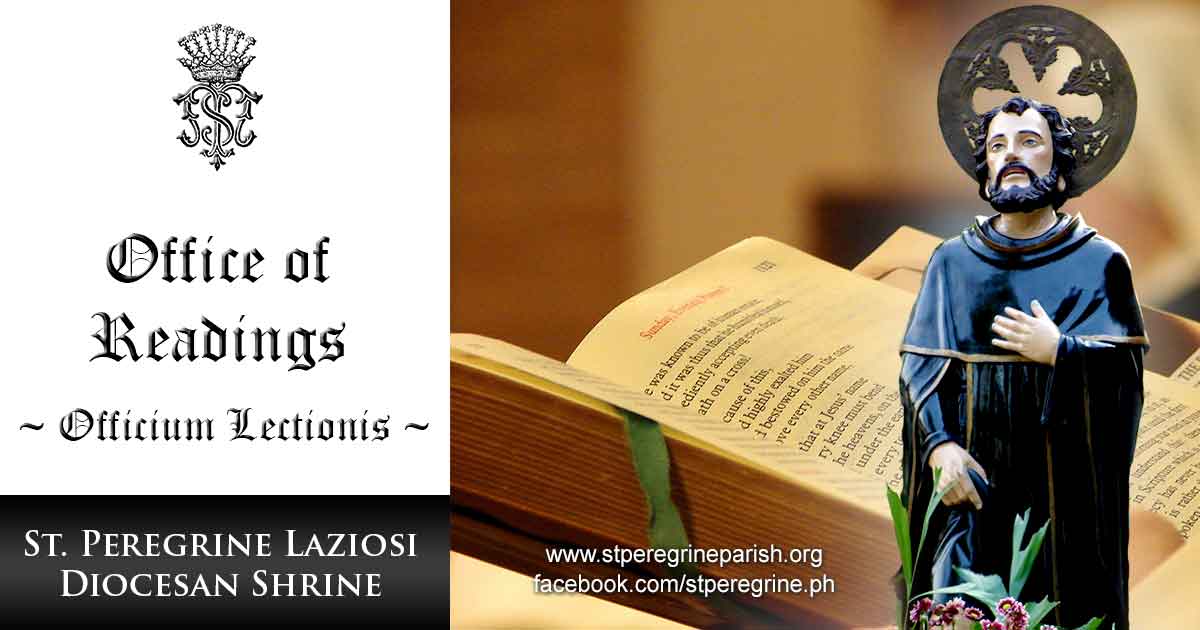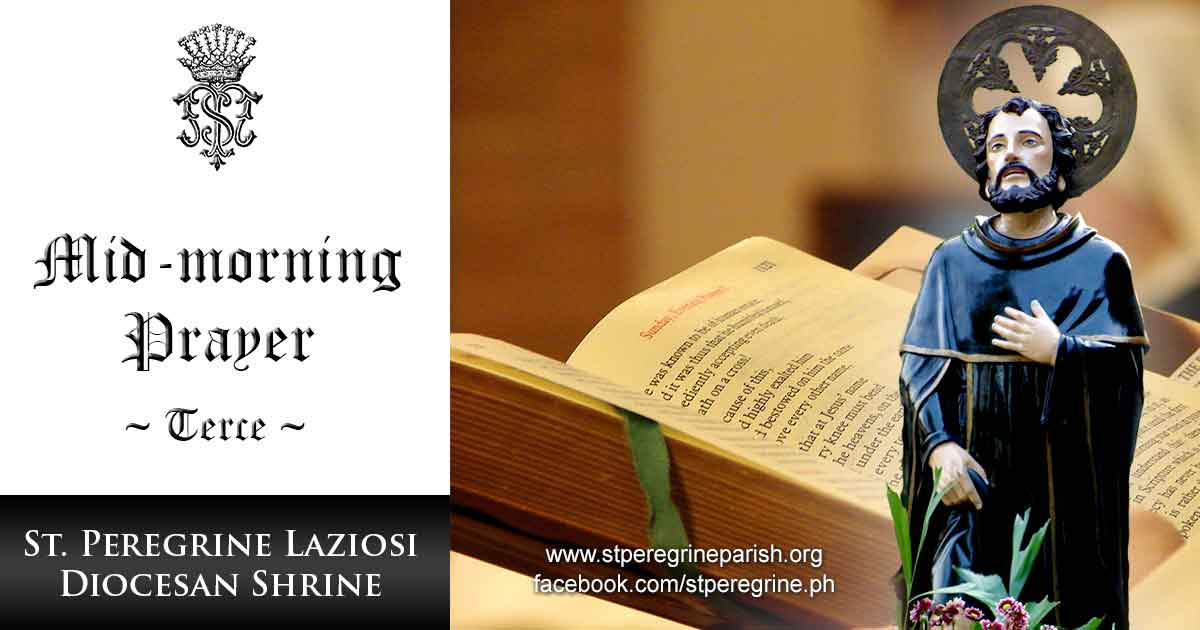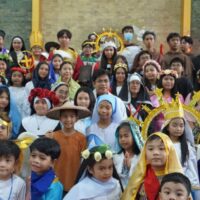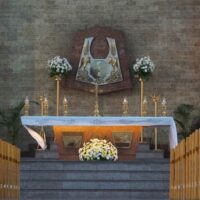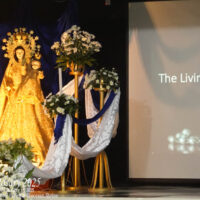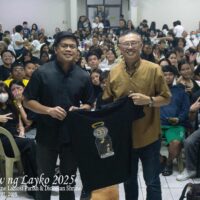Ribbon Placement:
Liturgy of the Hours Vol. II:
Ordinary: 1045
Proper of Seasons: 192
Psalter: Friday, Week II, 1321
Office of Readings for Friday of the 2nd Week of Lent
God, come to my assistance.
— Lord, make haste to help me.
Glory to the Father, and to the Son, and to the Holy Spirit:
— as it was in the beginning, is now, and will be for ever. Amen.
HYMN
1 The Lord is my shepherd; I shall not want.
2 He maketh me to lie down in green pastures: he leadeth me by the still waters.
3 He restoreth my soul: he leadeth me in the paths of righteousness for his name’s sake.
4 Yea, though I walk through the valley of the shadow of death, I will fear no evil: for thou art with me; thy rod and thy staff they comfort me.
5 Thou preparest a table for me in the presence of my enemies: thou anointest my head with oil; my cup runneth over.
6 Surely goodness and mercy shall follow me all the days of my life: and I will dwell in the house of my Lord for ever.
| 𝄞 | “Psalm 23” by Melinda Kirigin-Voss • • Available on iTunes • Text from Psalm 23 King James Version; Used wih permission • Albums that contain this Hymn: Yesterday, Today, and Forever |
PSALMODY
Ant. 1 Lord, in your anger, do not punish me.
Psalm 38
A sinner in extreme danger prays earnestly to God
All his friends were standing at a distance (Luke 23:49).
I
O Lord, do not rebuke me in your anger;
do not punish me, Lord, in your rage.
Your arrows have sunk deep in me;
your hand has come down upon me.
Through your anger all my body is sick:
through my sin, there is no health in my limbs.
My guilt towers higher than my head;
it is a weight too heavy to bear.
Glory to the Father, and to the Son, and to the Holy Spirit:
— as it was in the beginning, is now, and will be for ever. Amen.
Ant. Lord, in your anger, do not punish me.
Ant. 2 Lord, you know all my longings.
II
My wounds are foul and festering,
the result of my own folly.
I am bowed and brought to my knees.
I go mourning all the day long.
All my frame burns with fever;
all my body is sick.
Spent and utterly crushed,
I cry aloud in anguish of heart.
O Lord, you know all my longing:
my groans are not hidden from you.
My heart throbs, my strength is spent;
the very light has gone from my eyes.
My friends avoid me like a leper;
those closest to me stand afar off.
Those who plot against my life lay snares;
those who seek my ruin speak of harm,
planning treachery all the day long.
Glory to the Father, and to the Son, and to the Holy Spirit:
— as it was in the beginning, is now, and will be for ever. Amen.
Ant. Lord, you know all my longings.
Ant. 3 I confess my guilt to you, Lord; do not abandon me, for you are my savior.
III
But I am like the deaf who cannot hear,
like the dumb unable to speak.
I am like a man who hears nothing,
in whose mouth is no defense.
I count on you, O Lord:
it is you, Lord God, who will answer.
I pray: “Do not let them mock me,
those who triumph if my foot should slip.”
For I am on the point of falling
and my pain is always before me.
I confess that I am guilty
and my sin fills me with dismay.
My wanton enemies are numberless
and my lying foes are many.
They repay me evil for good
and attack me for seeking what is right.
O Lord, do not forsake me!
My God, do not stay afar off!
Make haste and come to my help,
O Lord, my God, my savior!
Glory to the Father, and to the Son, and to the Holy Spirit:
— as it was in the beginning, is now, and will be for ever. Amen.
Psalm-prayer
Do not abandon us, Lord our God; you did not forget the broken body of your Christ, nor the mockery his love received. We, your children, are weighed down with sin; give us the fullness of your mercy.
Ant. I confess my guilt to you, Lord; do not abandon me, for you are my savior.
Sacred Silence (indicated by a bell) – a moment to reflect and receive in our hearts the full resonance of the voice of the Holy Spirit and to unite our personal prayer more closely with the word of God and public voice of the Church.
Turn back to the Lord your God.
— He is kind and merciful.
READINGS
First reading
From the book of Exodus
19:1-19; 20:18-21
The promise of the covenant and the revelation of the Lord on Mount Sinai
In the third month after their departure from the land of Egypt, on its first day, the Israelites came to the desert of Sinai. After the journey from Rephidim to the desert of Sinai, they pitched camp.
While Israel was encamped here in front of the mountain, Moses went up the mountain to God. Then the Lord called to him and said, “Thus shall you say to the house of Jacob; tell the Israelites: You have seen for yourselves how I treated the Egyptians and how I bore you up on eagle wings and brought you here to myself. Therefore, if you hearken to my voice and keep my covenant, you shall be my special possession, dearer to me than all other people, though all the earth is mine. You shall be to me a kingdom of priests, a holy nation. That is what you must tell the Israelites.”
So Moses went and summoned the elders of the people. When he set before them all that the Lord had ordered him to tell them, the people all answered together, “Everything the Lord has said, we will do.” Then Moses brought back to the Lord the response of the people.
The Lord also told him, “I am coming to you in a dense cloud, so that when the people hear me speaking with you, they may always have faith in you also.” When Moses, then, had reported to the Lord the response of the people, the Lord added, “Go to the people and have them sanctify themselves today and tomorrow. Make them wash their garments and be ready for the third day; for on the third day the Lord will come down on Mount Sinai before the eyes of all the people. Set limits for the people all around the mountain, and tell them: Take care not to go up the mountain, or even to touch its base. If anyone touches the mountain, he must be put to death. No hand shall touch him; he must be stoned to death or killed with arrows. Such a one, man or beast, must not be allowed to live. Only when the ram’s horn resounds may they go up to the mountain.”
Then Moses came down from the mountain to the people and had them sanctify themselves and wash their garments. He warned them, “Be ready for the third day. Have no intercourse with any woman.”
On the morning of the third day there were peals of thunder and lightning, and a heavy cloud over the mountain, and a very loud trumpet blast, so that all the people in the camp trembled. But Moses led the people out of the camp to meet God, and they stationed themselves at the foot of the mountain. Mount Sinai was all wrapped in smoke, for the Lord came down upon it in fire. The smoke rose from it as though from a furnace, and the whole mountain trembled violently. The trumpet blast grew louder and louder, while Moses was speaking and God answering him with thunder.
When the people witnessed the thunder and lightning, the trumpet blast and the mountain smoking, they all feared and trembled. So they took up a position much farther away and said to Moses, “You speak to us, and we will listen; but let not God speak to us, or we shall die.” Moses answered the people, “Do not be afraid, for God has come to you only to test you and put his fear upon you, lest you should sin.” Still the people remained at a distance, while Moses approached the cloud where God was.
RESPONSORY Exodus 19:5, 6; 1 Peter 2:9
If you do what I tell you and keep my covenant, out of all the nations you will be my own possession, dearer to me than any other people.
— You shall be to me a kingdom of priests, a consecrated nation.
You are a chosen race, a royal priesthood, a consecrated nation, a people God has claimed as his own.
— You shall be to me a kingdom of priests, a consecrated nation.
Second reading
From the treatise Against Heresies by Saint Irenaeus, bishop
The covenant of the Lord
In the book of Deuteronomy Moses says to the people: The Lord your God made a covenant on Horeb; he made this covenant, not with your fathers but with you. Why did God not make this covenant with their fathers? Because the law is not aimed at the righteous. Their fathers were righteous: they had the power of the Decalogue implanted in their hearts and in their souls. That is, they loved the God who made them and did nothing unjust against their neighbor. For this reason they did not need to be admonished by written rebukes: they had the righteousness of the law in their hearts.
When this righteousness and love for God had passed into oblivion and had been extinguished in Egypt, God had necessarily to reveal himself through his own voice, out of his great love for men. He led the people out of Egypt in power, so that man might once again become God’s disciple and follower. He made them afraid as they listened, to warn them not to hold their Creator in contempt.
He fed them with manna, that they might receive spiritual food. In the book of Deuteronomy Moses says: He fed you with manna, which your fathers did not know, that you might understand that man will not live by bread alone but by every word of God coming from the mouth of God.
He commanded them to love himself and trained them to practice righteousness toward their neighbor, so that man might not be unrighteous or unworthy of God. Through the Decalogue he prepared man for friendship with himself and for harmony with his neighbor. This was to man’s advantage, though God needed nothing from man.
This raised man to glory, for it gave him what he did not have, friendship with God. But it brought no advantage to God, for God did not need man’s love. Man did not possess the glory of God, nor could he attain it by any other means than through obedience to God. This is why Moses said to the people: Choose life, that you may live and your descendants too; love the Lord your God, hear his voice and hold fast to him, for this is life for you and length of days.
This was the life that the Lord was preparing man to receive when he spoke in person and gave the words of the Decalogue for all alike to hear. These words remain with us as well; they were extended and amplified through his coming in the flesh, but not annulled.
God gave to the people separately through Moses the commandments that enslave: these were precepts suited to their instruction or their condemnation. As Moses said: The Lord commanded me at that time to teach you precepts of righteousness and of judgment. The precepts that were given them to enslave and to serve as a warning have been cancelled by the new covenant of freedom. The precepts that belong to man’s nature and to freedom and to all alike have been enlarged and broadened. Through the adoption of sons God had enabled man so generously and bountifully to know him as Father, to love him with his whole heart, and to follow his Word unfailingly.
RESPONSORY
Moses, the servant of the Lord, fasted for forty days and forty nights
— to prepare himself to receive the law of the Lord.
Moses went up Mount Sinai to the Lord, and stayed there forty days and forty nights.
— To prepare himself to receive the law of the Lord.
CONCLUDING PRAYER
Grant,
we pray, almighty God,
that, purifying us by the sacred practice of penance,
you may lead us in sincerity of heart
to attain the holy things to come.
Through our Lord Jesus Christ, your Son,
who lives and reigns with you in the unity of the Holy Spirit,
one God, for ever and ever.
— Amen.
ACCLAMATION (at least in the communal celebration)
Let us praise the Lord.
— And give him thanks.
The English translation of The Liturgy of the Hours (Four Volumes) ©1974,
International Commission on English in the Liturgy
Corporation. Readings and Old and New Testament Canticles (except the Gospel Canticles) are from the New American Bible
© 1970 Confraternity of Christian Doctrine, Washington, D.C.. Used with permission. All rights reserved.
The DivineOffice.org website, podcast, apps and all related media follows the liturgical calendar for the United States.
The 1970 edition of the New American Bible as published in the Liturgy of the Hours is approved for use
only in the United States. DivineOffice.org website, podcast, apps and all related media is © 2006-2021
Surgeworks, Inc. All rights reserved.
 Diocese of Parañaque
Diocese of Parañaque

